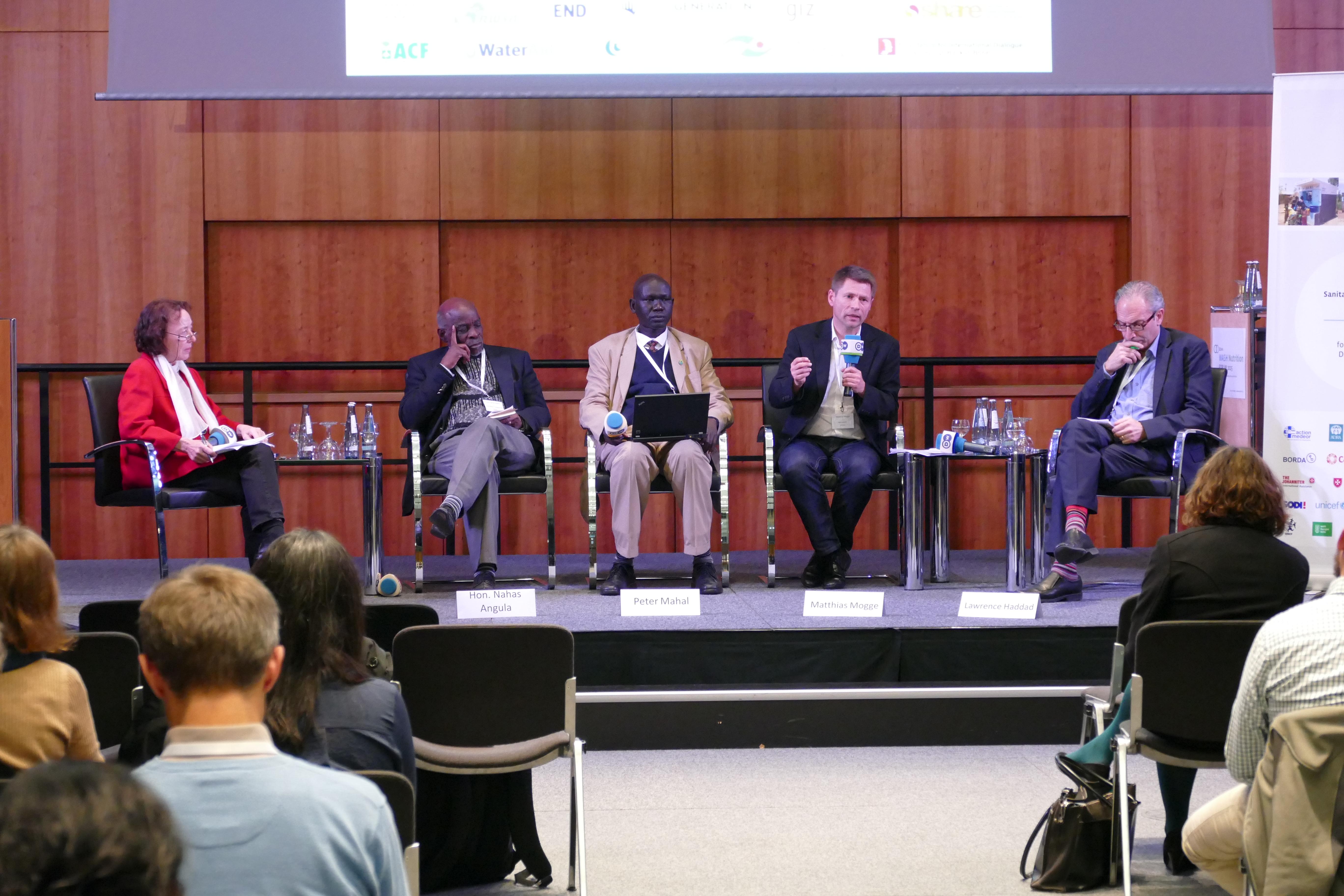Reflecting on Bonn

Day 1 Panel Discussion: Peter Mahal, Honorable Nahas Angula, Matthias Mogge, and Lawrence Haddad. Credit: German WASH Network
Last week we at the GTO were delighted to convene the 2015 WASH Nutrition Forum. Over 100 delegates from more than 20 countries attended, and a further 300-400 people joined in via web cast and the online discussion forum. Representing academia, governments and policy makers, donors, civil society and practitioners from the WASH and nutrition sectors, participants turned out to learn about their respective sectors’ initiatives and progress and to identify opportunities for collaboration and partnership between the two sectors.
WASH and Nutrition: the Linkages
We heard from a range of global experts on the interrelationship of WASH and nutrition.
First, Oliver Cumming of LSHTM, underlined the strong and continuously growing scientific evidence base for forging closer relationships between the two sectors, particularly through policy development and revisiting WASH interventions. He highlighted past and ongoing studies that underline the (multi) causal relationship that is particularly salient to the first 1000 days of children’s lives and for their subsequent growth and socio-economic development.
Then ‘mirror sessions’ took place, during which participants were encouraged to reflect on their work and its impact on the other sector:
- Bruce Gordon of WHO and Lawrence Haddad of the International Food Policy Research Institute, Sussex, spoke on the monitoring of WASH and nutrition actions from a global perspective, with specific reference to the GLAAS, JMP and Global Nutrition reports.
- Catarina de Albuquerque of the Sanitation and Water for All Partnership, and Florence Lasbennes of the Scaling Up Nutrition Movement, highlighted the value of global partnerships.
- Finally, Jean Lapegue of Action Contre la Faim, and Josephine Ippe of UNICEF, introduced the normative and operational dimensions of the WASH and Global Nutrition Clusters which were formed in context of the humanitarian reform in 2006 to improve coordination during humanitarian crisis. In essence it was communicated that nutrition-specific interventions have advanced and opportunities are seen for the betterment of nutrition-sensitive interventions.
Asked about the overall first day assessment, the day 1 panelists Peter Mahal, Matthias Mogge, Honorable Nahas Angula and Lawrence Haddad expressed the need to focus on the primary health outcomes as laid down in the SDGs, transitioning to joint learning, programming and monitoring of WASH-Nutrition activities, and identifying ways to reach those target populations that have not been reached during the MDGs.
Day 2 commenced with ‘mirror sessions’ between Peter Mahal and Josephine Quedraogo/Baro, country delegates from South Sudan and Burkina Faso. They discussed the country specific systems hosting the designated sectors with their specific advantages and disadvantages.
To complement previous discussions with practical examples, five short presentations were delivered by Dr. Oliver Hoffmann on the SPHERE standards for WASH and nutrition in humanitarian aid, Dr. Arne Panesar with an introduction of the SuSanA Network, Jeremy Shoham describing the Emergency Nutrition Network, Erin Flynn speaking on WASH and nutrition integration and what it can mean in practice, and Dr. Marie Benner presenting a WASH and nutrition program implemented in Cambodia by Malteser International.
During the next ‘mirror discussion’ we heard from Megan Macgarry of End Water Poverty, Ben Hobbs of Generation Nutrition, and Abigail Mupambi who expressed the need for civil society organisations to develop multi-sector profiles and shared visions with broader end goals.
The final ‘mirror discussion’ took place between Drs Stefan Schmitz and Tania Rödiger-Vorwerk of BMZ who explained how the ‘ONE WORLD – No Hunger’ initiative was formed and positioned within the Ministry. Both strongly point out that the wheel should not be reinvented, but rather good analysis of what has worked well previously is required for progress.
Wrapping Up
During the final panel, the panelists emphasized that there is a sufficient research base for strategic integration and advocated for the demystification of the integration issue by planning doable, feasible and creative actions. The Forum was unique in its composition and was a testimony to extremely high enthusiasm for closer linkages between the sectors. Several concrete commitments and a timeline listing dates during which further action can be taken to create sustainable collaborations were formulated.
Find Out More
More detailed information about the Forum, video snippets, presentations and pictures as well as a list of doable next steps and concrete commitments from participating organizations will soon be made available on the SuSanA and the German WASH Network websites.
